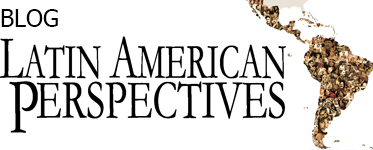
Trump’s Second Thoughts on Juan Guaido are Not Enough
| Political Report # 1446
Trump’s Second Thoughts on Juan Guaido are Not Enough |
|
Abstract, Neoliberal Urbanization and Synergistic Violence in Postearthquake Concepción
Neoliberal Urbanization and Synergistic Violence in Postearthquake Concepción | July 3, 2020
by Christian Paulo Matus Madrid, Rodrigo Ganter, Juan Antonio Carrasco, and Camila Barraza Huaiquimilla
The Chilean neoliberal state’s institutional strategy for displacing a historical population from Aurora de Chile, a centrally located area with real estate value in the city of Concepción, combined three types of violence: shock urbanization, which used the 2010 earthquake as an opportunity to impose the construction of major infrastructure, the construction of public opinion aimed at naturalizing displacement, and the strategic use of participation as a disciplinary socio-technical […]
Abstract, Remittances, the Rescaling of Social Conflicts, and the Stasis of Elite Rule in El Salvador
Remittances, the Rescaling of Social Conflicts, and the Stasis of Elite Rule in El Salvador
by Hannes Warnecke-Berger | July 1, 2020
Remittances are the dominant factor in the contemporary economy of El Salvador, which is enjoying a new comparative advantage in the international economic system—the export of cheap labor to the Global North and particularly the United States. The Salvadoran economy is part of a transnational economic space, but this space is perverse: Although the poor are nominally receiving more money, remittances cause them to be caught in a vicious cycle of economic instability. At the same […]
Abstract, Remittances, the Rescaling of Social Conflicts, and the Stasis of Elite Rule in El Salvador
by Hannes Warnecke-Berger | July 1, 2020
Remittances are the dominant factor in the contemporary economy of El Salvador, which is enjoying a new comparative advantage in the international economic system—the export of cheap labor to the Global North and particularly the United States. The Salvadoran economy is part of a transnational economic space, but this space is perverse: Although the poor are nominally receiving more money, remittances cause them to be caught in a vicious cycle of economic instability. At the same time, the elites are able to access remittances indirectly by becoming a Keynesian oligarchy—an oligarchy […]
Abstract, Neoliberal Urbanization and Synergistic Violence in Postearthquake Concepción
by Christian Paulo Matus Madrid, Rodrigo Ganter, Juan Antonio Carrasco, and Camila Barraza Huaiquimilla | July 3, 2020
The Chilean neoliberal state’s institutional strategy for displacing a historical population from Aurora de Chile, a centrally located area with real estate value in the city of Concepción, combined three types of violence: shock urbanization, which used the 2010 earthquake as an opportunity to impose the construction of major infrastructure, the construction of public opinion aimed at naturalizing displacement, and the strategic use of participation as a disciplinary socio-technical device to legitimize a solution to the conflict that guaranteed the […]
Abstract, The Uses of Culture in the Last Argentine Dictatorship (1976–1983)
The Uses of Culture in the Last Argentine Dictatorship (1976–1983): From Studies of Repression to Analyses of the Construction of Consensus | JUne 29, 2020
by Laura Schenquer
Democratic governments are not the only ones that formulate political strategies to generate consensus. The last Argentine dictatorship (1976–1983) also developed cultural, educational, and communication policies to maintain and increase its support and to curb the opposition. However, these policies have not been studied in the postdictatorship, largely because of the prevalence of the image of the apagón cultural (cultural blackout)—the notion that the dictatorship’s project was simply repression and […]
Transnational Organizations, Accessibility, and the Next Generation
by Jack Durrell | June 26, 2020
Involvement in transnational organizations is an understudied aspect of next-generation transnationalism, the cross-border connections maintained by individuals born and/or raised in countries of settlement. Exploration of institutional accessibility—the existence or nonexistence of barriers to next-generation inclusion—across a nonrepresentative sample of Mexican and Salvadoran transnational political and philanthropic groups operating in California and Washington, DC, shows how it can facilitate next-generation involvement in cross-border organizations. Accessibility is judged in terms of four main indicators: resource constraints, outreach strategies, involvement in U.S. political arenas, and pervasive institutional cultures.
CONTINUE READING FULL ARTICLE HERE
La […]
Abstract, Social Movements, Crises, and Mobilizations: A Look at Summer 2019
by Liliana Cotto Morales
Beginning in the 1990s and in the first five years of the twenty-first century, we saw a strengthening of social movements that had achieved political space for combating U.S. neoliberal strategies and halting the dangerous influence of big business and capitalist governments. These movements became the protagonists influencing state policies in several Latin American countries and other regions. A systematic study of the knowledge produced by this resistance and insurgency may suggest alternatives that could be transformed into solutions.


